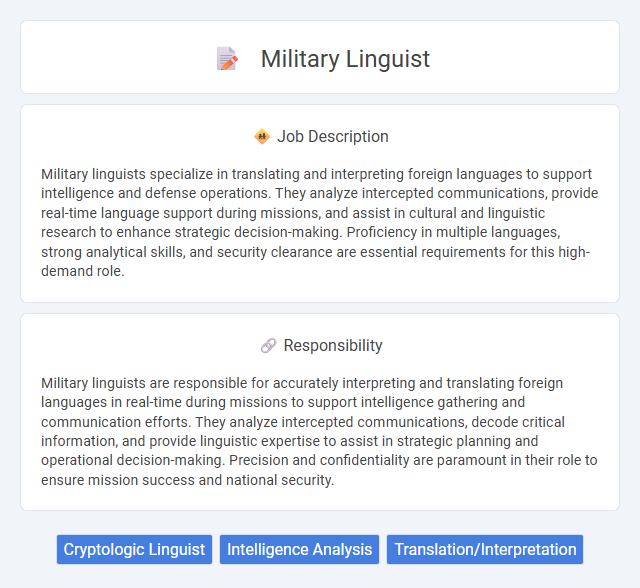
Military linguists specialize in translating and interpreting foreign languages to support intelligence and defense operations. They analyze intercepted communications, provide real-time language support during missions, and assist in cultural and linguistic research to enhance strategic decision-making. Proficiency in multiple languages, strong analytical skills, and security clearance are essential requirements for this high-demand role.
Individuals with strong language skills, cultural awareness, and the ability to work under pressure are likely suitable for a military linguist role. Those who thrive in disciplined, fast-paced environments and possess adaptability may find this career fulfilling. People lacking stress tolerance or interest in languages might face challenges in meeting job demands.
Qualification
Military linguists require proficiency in one or more foreign languages, strong analytical skills, and the ability to interpret complex communications accurately. Candidates typically must pass rigorous language proficiency tests and undergo specialized training in intelligence and cultural awareness. Security clearances and a background in linguistics, cryptology, or related fields enhance qualifications for this role.
Responsibility
Military linguists are responsible for accurately interpreting and translating foreign languages in real-time during missions to support intelligence gathering and communication efforts. They analyze intercepted communications, decode critical information, and provide linguistic expertise to assist in strategic planning and operational decision-making. Precision and confidentiality are paramount in their role to ensure mission success and national security.
Benefit
Military linguists likely provide critical language skills that enhance communication and intelligence gathering, increasing the probability of mission success. Benefits may include access to specialized training, competitive pay, and potential career advancement within the armed forces. There is also a strong possibility of gaining valuable cultural insights and technical expertise transferable to civilian roles.
Challenge
The role of a military linguist likely presents significant challenges due to the need for precise and rapid language interpretation in high-pressure environments. There is a strong probability that adapting to diverse dialects and cultural nuances adds complexity to communication tasks. Handling sensitive information reliably may also demand continuous training and strict adherence to confidentiality protocols.
Career Advancement
Military linguists possess specialized language skills critical for intelligence gathering and communication in defense operations, making career advancement opportunities significant within military and government sectors. With experience, they can progress to senior linguist roles, language analysts, or intelligence officers, often receiving advanced training in cryptography, cybersecurity, or foreign intelligence. Leadership positions in language program management or strategic communications offer further growth, emphasizing the critical role linguistic expertise plays in national security initiatives.
Key Terms
Cryptologic Linguist
Cryptologic linguists play a vital role in military intelligence by intercepting, analyzing, and translating foreign communications to provide actionable information. These specialists use advanced language skills and cryptographic techniques to decode encrypted messages, enhancing national security and supporting strategic operations. Proficiency in languages such as Arabic, Mandarin, Russian, or Korean is highly sought after for effective intelligence gathering and threat assessment.
Intelligence Analysis
Military linguists specializing in intelligence analysis play a crucial role in interpreting and translating foreign communications to provide actionable insights for national security. They utilize advanced language skills combined with cultural knowledge to decode sensitive information, supporting mission-critical decisions and threat assessments. Expertise in multiple languages, cryptographic systems, and intelligence software enhances their ability to analyze intercepted communications rapidly and accurately.
Translation/Interpretation
Military linguists specializing in translation and interpretation provide critical language support by converting foreign communications into actionable intelligence for defense operations. They accurately translate written documents and interpret intercepted conversations in real-time, ensuring precise understanding of enemy intentions and strategic information. Their expertise in multiple languages directly enhances communication between allied forces and facilitates mission success in diverse operational environments.
 kuljobs.com
kuljobs.com